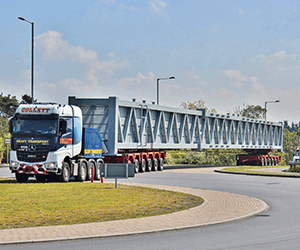David Windsor, 62, from Bristol, suffered life changing injuries, including severe brain damage, in the incident at a site in Devonport, on 7 October 2010.
He also sustained facial fractures, serious injuries to right arm, fractured ribs, a fractured pelvis, leg fractures and foot injuries all on his right side where the dumper ran over him.
He spent two weeks in intensive care, a month in a high dependency unit and was finally discharged home from a brain injury rehabilitation unit in April, 2011 – more than six months later.
Plymouth Crown Court heard that Windsor, a delivery driver, was delivering a mortar silo to the Leadbitter site – a former MoD property where 159 new homes were being built.
He was wearing high-visibility clothing, but was hit by the dumper as he was crossing the site to return to his lorry.
HSE established that there was no segregated, defined area provided for people on foot.
JB Leadbitter, as the the principal contractor for the site, had not produced or put in place a suitable traffic management plan to ensure the separation of vehicles and pedestrians using the roadway at the site.
JB Leadbitter and Co Ltd, of Abingdon in Oxfordshire, was found guilty of safety breaches and was fined £100,000 and ordered to pay full costs of around £100,000.
HSE Inspector Jonathan Harris, speaking after the hearing, said: “This terrible incident has left Mr Windsor with significant and lasting injuries and could easily have led to his death. It is unlikely he will be able to return to work again.
“Simple forethought and planning could have avoided this happening.
“JB Leadbitter failed to identify risks to site workers and visitors, such as delivery drivers, in their construction phase plan and made no provision for segregating site vehicles and pedestrians at the top end of the site.
“Other workers on this large site were frequently exposed to serious risks as a result of this lack of planning.
“Workplace transport incidents are the second most common cause of serious and fatal incidents in the construction industry, yet they could easily be avoided by having proper plans in place and provision for pedestrians on site.”

 (590 × 200px) - Dec 24.gif)























































.gif)

